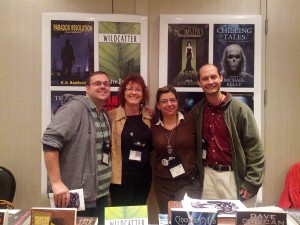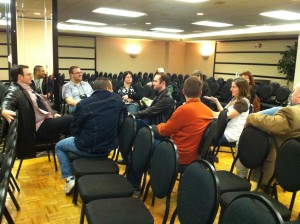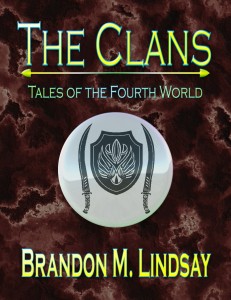
Guest Post by Nora Zelevansky
I probably shouldn’t admit this, but when I first heard the term “NaNoWriMo,” I thought maybe it was a Star Trek species or a riff on Robin Williams’ “Nanu, Nanu” alien catchphrase from 1970’s sitcom Mork & Mindy.
In case you don’t already know: it is neither of those things.
NaNoWriMo is an acronym for National Novel Writing Month. And, lest you assume (as I would) that it’s some random meaningless designation like Bacon Appreciation Week or Balloon Animal Day (not to downplay the importance either of those deeply important celebrations), I can assure you that this is serious business.
During the month of November each year, thousands of people all over the country commit to writing about 1,677 words a day sans outlines and without editing. At the end of the month, each person is meant to have a relatively short (about 50,000 word) draft of a novel. And some of those novels eventually get published. My book Semi-Charmed Life was fortunate enough to be among those.
Being largely based on free association, that resulting first draft is generally a bit of a mess. At least, that’s true in my case. In 2009, I participated for the first time, moved by the desire to find out if I could write fiction. I am, after all, a journalist, whose forays into creative writing had previously been relegated to personal essays, memoirs and creative nonfiction. But I was craving an outlet without deadlines or specific guidelines for my voice. I was in the mood for a different kind of challenge.
For me, NaNoWriMo was a game changer. And I am not alone. Not even close. This wasn’t the first time I’d toyed with ideas for books, usually getting all excited and then deciding a mere week or two later that the concepts were lame, would never go anywhere and were not worth months or years of anyone’s time. But this was the first time I was offered a structure for writing a novel, that I was instructed to pick an idea (even if just for the first page or chapter) and stick with it … no matter what.
Though I am disciplined as a writer (I have to be as a freelance journalist), I’m not big on enforced structure. So, for me, it was relief not to have to have to outline or research much, elements that NaNo discourages. And, as goofy as the supportive exclamation point-filled NaNoWriMo emails sometimes seemed from the cheerleading staff of fellow writers, knowing that thousands of others were attempting the same feat did keep me on track. And don’t even get me started on the graph: Participants sign up online, create profiles then watch a graph that tracks their word count accomplishments grow and shrink. I can’t quite tell you why, but that graph kept me honest. I couldn’t bear fail it! It kept me writing even on difficult days.
That is to say; as much as I enjoyed the process, I also found it difficult sometimes. Like everyone else, I started on November 1st of that year. Which was my first wedding anniversary. Which was the day I was traveling via plane with ten buddies back from a best friend’s wedding in Mexico. Which was the day after their wedding, when I was a lot hungover from too much tequila and Churros. As you can imagine, I can’t say it was the most productive writing day of my life. And it would not be the only one that was rough going.
For most of us, no matter how much we adore writing or how much time we have to dedicate to the task on a given day, there are always times when the words just don’t flow, where what we scribble or type is pure crap. If I’d gone about writing my book through a different method, I would have, of course, had the luxury of taking a pass on those days, but that’s how you get stuck and give up. NaNo forces you to push through the less creative moments to get to the next thing. After all, you can always go back and edit when the month is through.
I won’t bore you with talk of my addiction to Cherry Coke Zero during that time or the explanations to my husband that got me through that time and out of certain holiday obligations, BUT suffice it to say that a plot emerged despite my total belief that it would not. And afterward, when I reread the draft, which truly was a big mess, I saw some elements that seemed worth pursuing and I started the rewriting process.
The Rewriting Quandary
For me, rewriting can be easier than writing for the first time. After all, there’s no blank page staring you in the face. But not everyone feels that way. So, how to keep yourself working on revisions long after the NaNo process has ended?
Well, first of all, I know that many colleges and continuing education institutions offer classes on taking your novel to the next level and so that structure and accountability can be helpful for some. I personally felt that I’d already put so much work into completing the draft. To abandon it then would just have felt wasteful. I wanted to see where it could go.
My book in particular was a strange mix of genres, part coming of age, part mystery, part humorous satire-that was never what I’d imagined I would write. And I was proud of it … and a little intrigued too.
I sent the draft to friends and family for feedback, made revisions, then sent it to more people I knew for notes. Of course, it’s not always easy to hear that feedback, but you just try to remember that its all in pursuit of a greater goal. People are only expressing opinions and, while you may not like everything you hear (in fact, you definitely won’t!), it’s helpful to give the manuscript to many people of different backgrounds and interests. That way, if they all give you a similar note or point to a similar problem, you know that it really does need to be addressed.
On Picking Readers For Notes
Another thought: we all have relationships in our life with people we love that are complicated. (And, yes, that’s probably a euphemism for something worse.) If you can, avoid sending those people the manuscript for feedback. It may seem obvious, but its’ really easy to make that mistake.
Ask yourself, will I be able to hear negative thoughts from this person and do I trust him or her to give me honest feedback without twisting the knife or trying to make me feel small? Does this person truly have my best interests in mind, in this context, or is our relationship competitive in some ways? Often people don’t even realize that your attempt to write a novel pushes emotional buttons for them, so it’s important that you consider everyone’s feelings, so that you don’t end up feeling angry, defeated or upset.
Once You Get Published
Anyway, a bazillion revisions later, the unimaginable (for me) happened: I found an agent who was excited about the story and she sold my book Semi-Charmed Life to Macmillan’s St. Martin’s Press. It hit bookstores this July 2012.
The day they handed me the galley and I actually held the bound manuscript in my hand in the form of a book was probably the proudest of my life. Of course, what’s amazing these days is that we can sell to publishers or self-publish and, either way, get to see our work in book form.
I spent most of the summer touring around like a crazy person, doing everything I could to promote the book. That’s harder than you’d imagine these days. Since Borders closed, the chance of someone just coming upon a book accidentally while browsing is down something like 25%. The greatest challenge is just letting people know that you and your book exist, then hopefully encouraging them to give it a chance.
My novel’s cover is pretty and sort of looks like a water color painting and it certainly has the components that suggests, but it has a darker, more literary, almost cartoonish side (compared sometimes to The Royal Tenenbaums in tone) and that’s something a person would only know from actually picking it up and reading it. So, the trick is getting people to try it out, to take that step.
The other night, I was at a cocktail party and was introduced to a fellow novelist. He told me the title of his book and I told him mine and we both vowed to buy copies. That’s a vow I’ll keep: as we both admitted, once we realized how tricky it is to get a story out there, we started buying books by every author we happened to meet. It just seems like good karma, like the right thing to do. And I’ve ended up reading some fantastic new books that way too!
While traveling around teaching writing workshops, giving readings and even calling and/or Skyping into book clubs around the country to discuss Semi-Charmed Life (something I am still enjoying very much), I often talk up the NaNoWriMo process. Sometimes I feel like I must sound like some crazy cultist because I am such a believer. But the process worked for me and I think, even for writers who care less about the outcome and more about the experience, it can be incredibly enriching on an emotional and creative level, like writing Morning Pages while doing The Artist’s Way. It’s an escape from the everyday, a chance to let your mind (as cheesy as it might sound) do its thing and run free without constrains.
For me, it was a chance to discover that I had a much wilder imagination than I’d assumed. Who knew? It’s been a new way for people to get to know me, as well. Friends and relatives have read the book and said things like, “I feel like I understand you on a whole other level now. And I think maybe you’re crazy.” Nice.
I have been using the NaNo process to write my second book for the last six weeks. It’s longer than 50,000 words and I couldn’t wait for November to start because I have an actual deadline this time from my publisher, but the basic principles still make sense.
Interestingly, this time is harder. That surprised me. I’m more inhibited by what I know about publishing and by expectations. I can let my mind run rampant to some extent, but I also have to make sure that I stay on track, so I don’t horrify my publisher. But its working, or I guess I’m working, and that’s what’s important.
Ultimately, I like to think I wasn’t entirely wrong about the definition of NaNoWriMo, when I first heard it bandied about. While the acronym may not refer to some alien species, it is sort of a strange cultural community full of people who allow their minds to take them to lands far, far away. And that’s a unique thing.
Meanwhile, I should be getting back to writing. Better say goodbye.
Or as they don’t say, but totally should, during National Novel Writing Month:
Nano Nano.
Good luck!
Semi-Charmed Life info, My website, Book For Sale, Facebook Author Page
Twitter handle: @missnoraz



